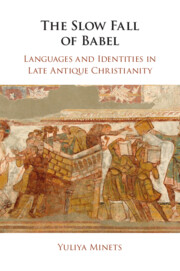Book contents
- The Slow Fall of Babel
- The Slow Fall of Babel
- Copyright page
- Dedication
- Contents
- Abbreviations
- Acknowledgments
- Introduction: Awakening to Linguistic Otherness
- Chapter 1 Meeting the Alloglottic Other: The Socio-Linguistic Landscape of the Ancient Mediterranean and the Spread of Christianity
- Chapter 2 Languages and Identities in Greco-Roman and Jewish Antiquity
- Chapter 3 The Tower of Babel and Beyond: The Primordial Linguistic Situation, the Original Language, and the Start of Linguistic Diversification
- Chapter 4 Speaking in Tongues in Christian Late Antiquity
- Chapter 5 Foreign Languages and the Discourse of Otherness
- Chapter 6 The Languages of Saints and Demons
- Conclusion: What’s in the Language?
- Bibliography
- Index
Chapter 1 - Meeting the Alloglottic Other: The Socio-Linguistic Landscape of the Ancient Mediterranean and the Spread of Christianity
Published online by Cambridge University Press: 02 December 2021
- The Slow Fall of Babel
- The Slow Fall of Babel
- Copyright page
- Dedication
- Contents
- Abbreviations
- Acknowledgments
- Introduction: Awakening to Linguistic Otherness
- Chapter 1 Meeting the Alloglottic Other: The Socio-Linguistic Landscape of the Ancient Mediterranean and the Spread of Christianity
- Chapter 2 Languages and Identities in Greco-Roman and Jewish Antiquity
- Chapter 3 The Tower of Babel and Beyond: The Primordial Linguistic Situation, the Original Language, and the Start of Linguistic Diversification
- Chapter 4 Speaking in Tongues in Christian Late Antiquity
- Chapter 5 Foreign Languages and the Discourse of Otherness
- Chapter 6 The Languages of Saints and Demons
- Conclusion: What’s in the Language?
- Bibliography
- Index
Summary
The purpose of the chapter is: first, to provide an overview of the socio-linguistic landscape of the late antique Mediterranean as a historical setting in which early Christian writers lived, worked, and developed their ideas on languages and religious identities; the linguistic and social practices they observed and experienced everyday set up an important context, even though their theoretical speculations may not directly reflect realities on the ground. Second, to briefly account for Christian encounters with foreign cultures and languages as the religion took off and to inquire into how the socio-linguistic situation in the ancient Mediterranean influenced the development of Christianity in its nascent stage and how Christianity in turn affected linguistic processes in the region. The spread of Christianity among various peoples and ethnic groups within and without the gradually disintegrating Roman empire was concurrent with complex formative processes within Christianity itself and took place amidst Trinitarian and Christological debates. The survey problematizes the role languages and linguistic distinctions played in these controversies and indicates several loci of potential tensions to be discussed further in the book (the alleged links between Punic speakers and Donatists, Germanic speakers and Arians, Syriac speakers and followers of non-Chalcedonian doctrines).
Keywords
- Type
- Chapter
- Information
- The Slow Fall of BabelLanguages and Identities in Late Antique Christianity, pp. 18 - 52Publisher: Cambridge University PressPrint publication year: 2021



